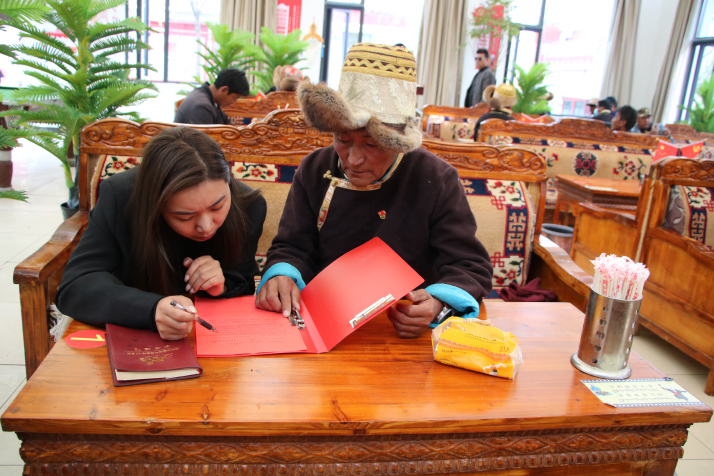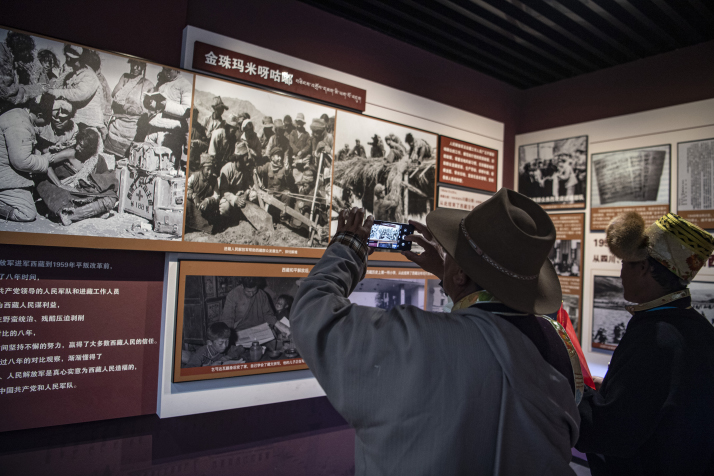| China |
| How people in Tibet Autonomous Region practice whole-process people's democracy | |
|
|
 Villagers discuss local affairs at the Dangqun Teahouse in Thangoche Village, Qiongjie County in Tibet Autonomous Region, on April 20, 2022 (XIONG QIFAN)
A red ribbon-shaped hand holding a cup of tea greets visitors of the Dangqun Teahouse in Thangoche Village, Qiongjie County in Tibet Autonomous Region. The logo represents the establishment's dual functions—serving tea and connecting villagers by engaging them in the governance of local affairs. In other words, it's a teahouse as well as an informal villager assembly hall.  The 2023 Forum on the Development of Xizang, China takes place in Beijing on May 23 (COURTESY PHOTO)
Multifunctional constructions The teahouse began to welcome patrons on January 7, 2022, becoming the first assembly hall-style teahouse in Qiongjie, which falls under the jurisdiction of Shannan City. Last year, the county invested 3 million yuan ($425,387) in the building of six Dangqun teahouses in different villages. Upon completion of construction, they were then handed to the villagers to manage them. Any villager can invest in this type of establishment. Take the teahouse in Thangoche, for example. Sixty households pooled their funds to decorate it and bring in dining tables, billiard tables, massage chairs and books. It has become a popular place for villagers to come have a cup of tea or a bowl of noodles and catch up with friends. And it's doing well. Fifty-nine-year-old stakeholder Dawa Yangzom has seen her investment generate positive returns every month. It's also an ideal place for villagers to share and comment on the latest news, solve disputes and manage local affairs. Before the teahouses were built, villagers used to discuss things happening in town inside the meeting rooms of the villagers' committee, a self-governing organization consisting of elected members. Now, the teahouse offers a new choice, a more relaxed venue, for coming together. "We freely air our views here," Baima Samzhub, a resident of Thangoche, told Lhasa-based news portal Xzxw.com. He added that villagers love sharing their opinions on the latest village news, serving up suggestions for local management and seeking advice on how to solve their own problems. "The teahouse is a good way to engage Tibetans in the governance of their own matters as these establishments play a key role in their daily life. It agrees with the local culture and conditions," Xu Wenhua, Deputy Dean of the Institute of Ethnology and Anthropology at the Chinese Academy of Social Sciences, told Beijing Review on May 23, when he attended the 2023 Forum on the Development of Xizang, China in Beijing. In the Chinese phonetic system, Tibet is romanized as Xizang. The one-day forum, themed on Tibet's high-quality development and human rights protection, featured subforums respectively on topics such as whole-process people's democracy, high-quality development, as well as culture and ecological progress in the region. Over 150 scholars from 36 countries and regions took part in the discussions. Xu was one of them. He worked in Tibet between 2015 and 2022 and visited 73 of the region's 74 counties and districts, which enabled him to closely observe the development of community-level democracy on the plateau. "I talked to many residents. They engage in local public affairs through community-level self-governance mechanisms including villagers' committees and the meetings of the representatives of urban community residents. They are truly the masters of their own affairs," he said. Tibet has put in place a system of community-level democracy with distinct characteristics, covering both farming and herding areas, since the region's democratic reform in 1959. On July 5 of that year, 443 peasants from Khesum Village in the Shannan region founded the first Tibetan farmer association, marking the beginning of community-level democracy in the region. In 1980, direct elections at the township level took place all over Tibet; they were expanded to the county level starting in 1984. As of 2013, over 95 percent of the villages in Tibet had established a system of villagers' representative meetings. "Community-level democracy is an important part of whole-process people's democracy," Xu said.  Visitors at a museum commemorating Tibet's democratic reform in Khesum, Shannan City, Tibet, on March 28 (XINHUA)
Multi-tier mechanisms China's whole-process people's democracy is a full-fledged system with supporting mechanisms and procedures and wide participation. Its system of state power consists of people's congresses and its basic political systems include multiparty cooperation and political consultation under the leadership of the Communist Party of China (CPC), regional ethnic autonomy and community-level self-governance, according to the fourth volume of Xi Jinping: The Governance of China, a compilation of Chinese President Xi's spoken and written works from February 3, 2020 to May 10, 2022. The system of people's congresses is the fundamental political system of China and there are such congresses at national, provincial, city, county and township levels. These congresses are formed through democratic elections. Before Tibet's democratic reform in 1959, the region was ruled by feudal serfdom under theocracy for centuries. With their absolute control of land, the three major types of estate-holders, including government officials, nobles and upper-ranking lamas in monasteries, held the power of life, death and marriage over their serfs. Serfs were subjected to exploitation and oppression and were denied all human rights, not to mention democracy and the right to participate in social governance. "The 'rule of a person' was the system in Tibet before its democratic reform," Roland Boer, Distinguished Professor at the School of Philosophy under Renmin University of China, said at the forum. The turning point came in 1959. On March 28 of that year, the State Council announced that the local government of Tibet had been dissolved and through democratic reform, feudal serfdom under theocracy was abolished from that moment on, bringing fundamental changes to the region's social system. The democratic reform led to the emancipation of about 1 million serfs. They gained personal freedom and became masters of their new society. "Since 1959, as the rule of law has developed in China, Tibet, too, has experienced the development of the rule of law and an associated legal system," Boer said. On December 20, 1959, the first session of the first Tibet regional committee of the Chinese People's Political Consultative Conference (CPPCC) took place in Lhasa, marking the establishment of the system of multiparty cooperation and political consultation under the CPC's leadership in Tibet. This system helps ensure that all Tibetans can voice their opinions and play roles in political life. Some religious workers have also become members of CPPCC committees at different levels. "Monks and nuns also hold the right to participate in the governance of society. Their participation is a microcosm of whole-process people's democracy," Xu said. In September 1965, the First Session of the First People's Congress of Tibet Autonomous Region convened in Lhasa, marking the formal establishment of this system in the region. Tibet's administrative, supervisory, judicial and procuratorial organs are all created by the regional people's congress to which they are responsible and by which they are supervised. "The development of both electoral and consultative democracy in Tibet is a huge step forward," Boer said. Tibet stepped out of the dark times of "the rule of a person" and marched into the era of the "rule of law." "For Tibet, this is a complete contrast to its earlier system, in which one person and his coterie were masters over Tibet. Now, the people are the masters of the house," Boer added. Boer believes the socialist rule of law entails the development of virtuous, apt laws. These good laws have been a feature of the significant development of the socialist rule of law in the last 30 years, seeking to express the core socialist values and developing laws that meet the people's ever-growing needs for a better life. "In a region like Tibet, the last item has been particularly important in the significant achievement of abolishing absolute poverty by late 2019," Boer said. By that time, all 628,000 registered impoverished residents in the 74 counties and districts in Tibet had risen out of extreme poverty—a first in their history. Tibet's economy is also making great strides. The region's GDP amounted to 57.587 billion yuan ($8.168 billion) in the first quarter of this year, a year-on-year increase of 8.2 percent and 3.7 percentage points higher than the national average, ranking first in the country. "All these achievements demonstrate the strength of democracy in Tibet Autonomous Region which has ultimately enabled it to achieve the full welfare of its people through their direct participation," Giuseppe Yoffreda, Ambassador of Venezuela to China, said at the forum. (Print Edition Title: Masters of Their Own Affairs) Copyedited by Elsbeth van Paridon Comments to linan@cicgamericas.com |
|
||||||||||||||||||||||||||||
|
